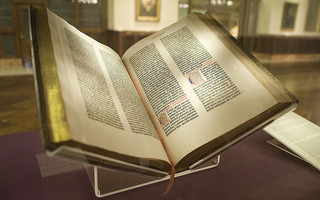 Last November (2013) a conference was held at Oberursel in Germany that involved the faculty of the Lutherische Theologische Hochschule of the independent Lutheran church in Germany (with which the LCMS is in fellowship), SELK (Selbstständige Evangelische Lutherische Kirche), and the exegetes from Concordia Seminary, St. Louis, supplemented by theologians from elsewhere in the world (Brazil, South Africa, Finland, etc.). Its purpose was to discuss matters related to hermeneutics, the principles for interpreting Scripture.
Last November (2013) a conference was held at Oberursel in Germany that involved the faculty of the Lutherische Theologische Hochschule of the independent Lutheran church in Germany (with which the LCMS is in fellowship), SELK (Selbstständige Evangelische Lutherische Kirche), and the exegetes from Concordia Seminary, St. Louis, supplemented by theologians from elsewhere in the world (Brazil, South Africa, Finland, etc.). Its purpose was to discuss matters related to hermeneutics, the principles for interpreting Scripture.
This conference sprang from a meeting held several years beforehand in Australia, when the Lutheran Church of Australia put together a conference on hermeneutics, because it has been dealing with issues related to women’s ordination to the pastoral office, and almost all questions about this matter come down to one’s principles for interpreting Biblical texts. Dr. Jeffrey Kloha represented our seminary at that Adelaide meeting, while Werner Klän of Oberursel represented SELK, and during the meeting the two men proceeded to discuss having a theological conference in Oberursel, to see where our two seminaries currently stood on contemporary hermeneutical issues.
The topics and presenters at Oberursel were:
- Historical approaches and issues: Dr. David Adams, Dr. Jörg Salzmann
- Literary approaches and issues: Dr. James Voelz, Dr. Achim Behrens
- Contextual Approaches: Dr. Timothy Saleska, Dr. Dieter Reinstorf (Bishop of Freie Evangelische Lutherische Kirche in Süd Afrika [FELSISA])
- Canon, the Text, and Authority: Dr. Jeffrey Kloha
Each paper also had a formal respondent. The Day of Exegetical Reflection, held on campus on May 8, 2014, provides the fruit of that conference from the St. Louis side. The four papers presented today represent the final drafts of the presentations by the representatives of Concordia Seminary. The sessions were well-attended, with constructive interaction and discussion both in the sessions themselves and throughout the day during breaks and meals. They presented here in order to provide those who were not able to attend the opportunity to engage these important issues as we all seek to listen to God’s Word faithfully.

Leave a Reply
You must be logged in to post a comment.